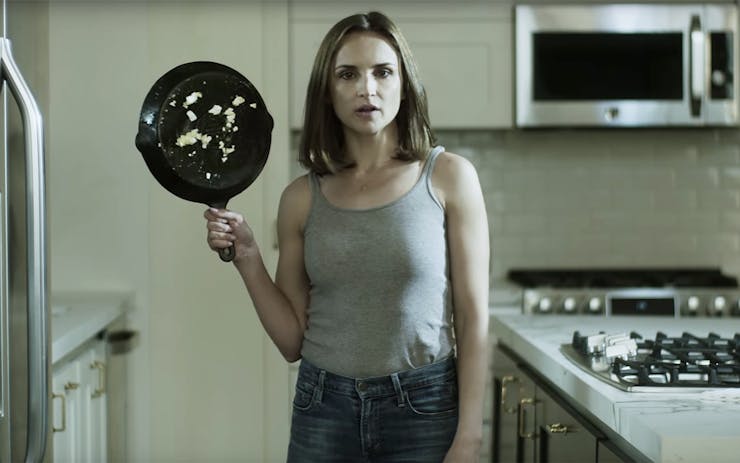For most ‘90s teenagers, Rachael Leigh Cook wasn’t remembered for her role as Laney Boggs in She’s All That, but rather for her dramatic, caustic performance in an anti-drug PSA where she smashed an uncooked egg with a frying pan. Sponsored by Partnership for a Drug-Free America, the 30-second spot featured Cook making a yolky mess in order to mimic heroin’s effect on the brain. It also included her smashing a set of plates, wall clock and a blender to show the havoc drugs wreak on the rest of one’s life.
Seeing the documentary '13th' forced the actress to reconsider her role in the war on drugs. And do something to correct it.
Now, about 20 years later, Cook has reprised her role in a similarly grey-hued PSA. Only this one has a new message.
“This, is one of the millions of Americans who uses drugs and won’t get arrested,” she says, holding up a white egg.
“However, this American,” she says, holding up a brown egg, “is several times more likely to be charged with a drug crime. Imagine it’s you.”
Instead of touting the terrors of drug use, Cook speaks about the war on drugs. She talks about an American criminal justice system in which minorities are arrested and prosecuted at a much higher rate than white offenders.
Although Cook’s new PSA was released in the flood of cannabis-related media on 4/20, it managed to outperform everything. The spot went viral on social media, and gained notice from Rolling Stone, Glamour, and other mainstream outlets. Within a week, the 90-second PSA was watched more than a million times on YouTube.
Leafly tracked down the spot’s creators, at the New York-based Green Point Creative to ask how the project came about.
Jon Mackey, Green Point managing director, said the ad wasn’t meant to be strictly about cannabis. A slew of other contemporary issues make it relevant, he said, including the opioid epidemic and Attorney General Jeff Sessions’ attempts to revive the failed drug war.
Howard Bowler, Green Point’s creative director, said that “the drug war should have never happened. It’s made life worse for a lot of people. And when you look at marijuana specifically, you can very easily argue that it has no business being scheduled at all.”
Personally Compelled
Bowler felt personally compelled to take on the racial injustice inherent in the war on drugs after “seeing mixed race family members” targeted by police, he said. Minorities are considered “easy targets” for law enforcement, Bowler added, since they often don’t have the resources to fight persecution the way members of the white community can.
The spot was intended to educate the public on the “collateral consequence” of the drug war, said Tony Newman, director of media relations for the Drug Policy Alliance, which worked with Green Point on the project.
“The War on Drugs is totally ineffective, ruins millions of peoples of lives and is totally racist when it comes to enforcement,” Newman said.
In some ways (and for some people) cannabis has become mainstream thanks to legalization and an influx of capital. But for others, the war on drugs is as vicious as ever, said Newman. It’s paradoxical for both these things to be happening simultaneously, he said.
Cook’s Participation Was Critical


Shop highly rated dispensaries near you
Showing you dispensaries near“Culturally we’ve evolved with our opinions and views of marijuana, and the way we’ve involved as a society also mirrors the way Rachael Leigh Cook has evolved,” Bowler said.
Landing Cook was key to the spot’s success. As luck would have it, she was in the right state of mind to do it. Cook called Ava DuVernay’s 13th—a criminal justice documentary that explores how the war on drugs has unfairly impacted minority communities—a “complete revelation.” The film forced her to reexamine her own involvement “with a larger movement that has gone on to harm so many,” she said in a statement.
“When my unique position brought about the opportunity to raise my voice again about this issue, I knew it was the right thing to do,” Cook said. “My hope now is to bring attention to the wildly unfair practices of drug sentencing and advocate for their reform.”
As of now, marijuana is a federal Schedule I drug, the same classification given heroin. Green Point hopes that through efforts like their own—including a scripted, fictional series on the war on drugs that’s in development—the will of the public will filter up to political leaders.
“The drug war and particularly marijuana arrests are a gateway,” said Bowler, “but they’re a gateway to prison…not a gateway to harder drugs.”





